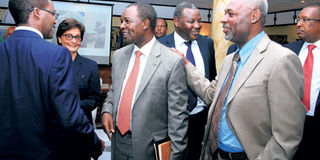We’ll name new Central Bank boss when the time comes, says Rotich

Central Bank of Kenya governor Njuguna Ndung’u (centre) is congratulated by members of the Kenya Bankers Association during a special luncheon organised by bank chief executives to bid him farewell mid this month. FILE
What you need to know:
- Prof Ndung’u’s tenure has been eight years of predictability. Anxiety has gripped markets, especially because it is unclear whether the next governor will pursue the Jubilee administration’s policy of bringing down interest rates more aggressively.
- Already, a new capital gains tax of 5 per cent and a VAT withholding tax of 6 per cent out of the 16 per cent standard VAT rate, have been introduced.
- The government expects to collect revenues equivalent to 0.2 per cent of GDP from the new capital gains tax, with the VAT withholding tax contributing 0.3 per cent of GDP in additional revenues.
Central Bank of Kenya governor Njuguna Ndung’u Thursday chaired his last Monetary Policy Committee meeting, leaving the interest rate unchanged.
His exit without a named successor, however, overshadowed the announcement. Prof Ndung’u’s last day in office is Monday next week.
“We will name a new governor when the time comes,” was the comment from Treasury Cabinet Secretary Henry Rotich when asked by reporters. Observers have argued that a transparent succession plan for the governor of the Central Bank of Kenya would have been a major boost to market confidence.
Prof Ndung’u’s tenure has been eight years of predictability. Anxiety has gripped markets, especially because it is unclear whether the next governor will pursue the Jubilee administration’s policy of bringing down interest rates more aggressively.
HIGH LENDING RATES
Indeed, the biggest challenge for Prof Ndung’u’s time at CBK has been the high lending spreads that have persisted, even after introduction of the much-touted Kenya Bank Reference Rate.
Yesterday, the Monetary Policy Committee signalled that the Central Bank’s desire is to keep rates steady.
Experts were, however, quick to observe that the ease in the monetary policy stance appeared to be at variance with the National Treasury, which seems to be in the mood for austerity, having just announced a new deal with the international Monetary Fund (IMF), that includes high taxes and deep spending cuts.
Already, a new capital gains tax of 5 per cent and a VAT withholding tax of 6 per cent out of the 16 per cent standard VAT rate, have been introduced.
The government expects to collect revenues equivalent to 0.2 per cent of GDP from the new capital gains tax, with the VAT withholding tax contributing 0.3 per cent of GDP in additional revenues.
A key element on the tight fiscal stance the government has adopted includes a semi-annual inflation indexation of specific excise taxes and abolition of VAT exemption on oil products.
Experts have warned that inflation indexation of taxes was likely to spark agitation of wage-indexation by trade unions. Still, Prof Ndung’u is leaving the scene after a satisfactory performance on most parameters.
Yesterday, the committee announced that month-on-month inflation had declined from 6.02 per cent in December 2014, to 5.53 per cent in January 2015.
This, it explained, was mainly as a result of lower fuel prices. The exchange rate of the Kenya shilling against the US Dollar has also remained fairly stable.
This is in spite of fears of low interest rates in Europe following quantitative easing by the European Central Bank.
The Central Bank attributed the relative stability of the local currency to investor confidence that has been boosted by the new deal the government signed with the IMF.
The CBK’s level of usable forex reserves currently stands at $7.2 billion, which is equivalent to 4.65 months of import cover.





